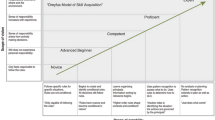Abstract
Serious games have potential for facilitating change processes but require rigorous, interdisciplinary design to be effective. A novel, rapid online workflow was developed for co-design of games for change with school teachers. Major design challenges included: short timescale; appropriately scaffolding a complex process; remote online interactions; and interdisciplinary communication. The resulting workflow is highly visual, structured, and focused on swift knowledge exchange between pedagogy and game experts, drawing on relevant frameworks. Two workshops used the new method, producing eight co-designed serious games. Analysis suggests the workflow is effective for knowledge exchange for the rapid and rigorous co-design of serious games and has advantages for inclusivity and confidence in the co-design process.
J. Craven—Independent Researcher.
Access this chapter
Tax calculation will be finalised at checkout
Purchases are for personal use only
Similar content being viewed by others
References
Dodero, G., Melonio, A., Gennari, R., Torello, S.: Gamified co-design with cooperative learning. In: Conference Human Factors Computing System – Proceedings, pp. 707–716 (2014). https://doi.org/10.1145/2559206.2578870
Pantić, N., Abbott, D.: Agents of Change. http://www.agentsofchangetoolkit.org/
Clark, D.B., Tanner-Smith, E.E., Killingsworth, S.S.: Digital games, design, and learning: a systematic review and meta-analysis. Rev. Educ. Res. 86, 79–122 (2016). https://doi.org/10.3102/0034654315582065
Catalano, C.E., Luccini, A.M., Mortara, M.: Best practices for an effective design and evaluation of serious games. Int. J. Serious Games. 1(1) (2014). https://doi.org/10.17083/ijsg.v1i1.8
Grey, S., Grey, D., Gordon, N., Purdy, J.: Using formal game design methods to embed learning outcomes into game mechanics and avoid emergent behaviour. Int. J. Game-Based Learn. 7(3), 63–73 (2017)
Lameras, P., Arnab, S., Dunwell, I., Stewart, C., Clarke, S., Petridis, P.: Essential features of serious games design in higher education: linking learning attributes to game mechanics. Br. J. Educ. Technol. 48(4), (2017). https://doi.org/10.1111/bjet.12467
United Nations Sustainable Development Goals. https://sdgs.un.org/goals
Abbott, D.: Intentional learning design for educational games : a workflow supporting novices and experts. In: Schmidt, M., Tawfik, A., Jahnke, I., Earnshaw, Y. (eds.) Learner and User Experience Research: An Introduction for the Field of Learning Design and Technology. EdTech Books (2020)
Marklund, B.B., Alklind Taylor, A.S.: Educational games in practice: the challenges involved in conducting a game-based curriculum. Electron. J. e-Learning. 14(2), 122–135 (2016)
Westera, W.: Why and how serious games can become far more effective: accommodating productive learning experiences, learner motivation and the monitoring of learning gains. Educ. Technol. Soc. 22, 59–69 (2019)
Lankford, B.A., Craven, J.: Rapid games designing; constructing a dynamic metaphor to explore complex systems and abstract concepts. Sustain. 12(17), (2020). https://doi.org/10.3390/su12177200
Lim, T., et al.: Strategies for effective digital games development and implementation. In: Baek, Y. and Whitton, N. (eds.) Cases on Digital Game-Based Learning: Methods, Models, and Strategies. pp. 168–198. IGI Global, Hershey, PA (2013)
Galabo, R., Nthubu, B., Cruickshank, L.: Redesigning a Workshop from Physical to Digital : Principles for Designing Distributed Co-design Approaches. Proc. Des. Vert. Horiz. Growth. (2020)
Davis, A., Wallace, N., Langley, J., Gwilt, I.: Low-contact co-design: considering more flexible spatiotemporal models for the co- design workshop. Strateg. Des. Res. J. 14, 124–137 (2021). https://doi.org/10.4013/sdrj.2021.141.11
Agbo, F.J., Oyelere, S.S., Suhonen, J., Laine, T.H.: Co-design of Mini Games for Learning Computational Thinking in an Online Environment. Springer, US (2021)
Arnab, S., et al.: Mapping learning and game mechanics for serious games analysis. Br. J. Educ. Technol. 46(2), 391–411 (2015). https://doi.org/10.1111/bjet.12113
Czauderna, A., Guardiola, E.: The gameplay loop methodology as a tool for educational game design. Electron. J. e-Learn. 17(3), 207–221 (2019). https://doi.org/10.34190/JEL.17.3.004
Anderson, L., Krathwohl, D.: A Taxonomy for Learning, Teaching, and Assessing: A Revision of Bloom’s Taxonomy of Educational Objectives. Allyn & Bacon, Boston, MA (2001)
Batchelor, J.: Autistica play launches inclusive game jam. https://www.gamesindustry.biz/articles/2020-03-02-autistica-play-launches-inclusive-game-jam
Author information
Authors and Affiliations
Corresponding author
Editor information
Editors and Affiliations
Rights and permissions
Copyright information
© 2021 Springer Nature Switzerland AG
About this paper
Cite this paper
Abbott, D., Chatzifoti, O., Craven, J. (2021). Serious Game Rapid Online Co-design to Facilitate Change Within Education. In: de Rosa, F., Marfisi Schottman, I., Baalsrud Hauge, J., Bellotti, F., Dondio, P., Romero, M. (eds) Games and Learning Alliance. GALA 2021. Lecture Notes in Computer Science(), vol 13134. Springer, Cham. https://doi.org/10.1007/978-3-030-92182-8_22
Download citation
DOI: https://doi.org/10.1007/978-3-030-92182-8_22
Published:
Publisher Name: Springer, Cham
Print ISBN: 978-3-030-92181-1
Online ISBN: 978-3-030-92182-8
eBook Packages: Computer ScienceComputer Science (R0)




